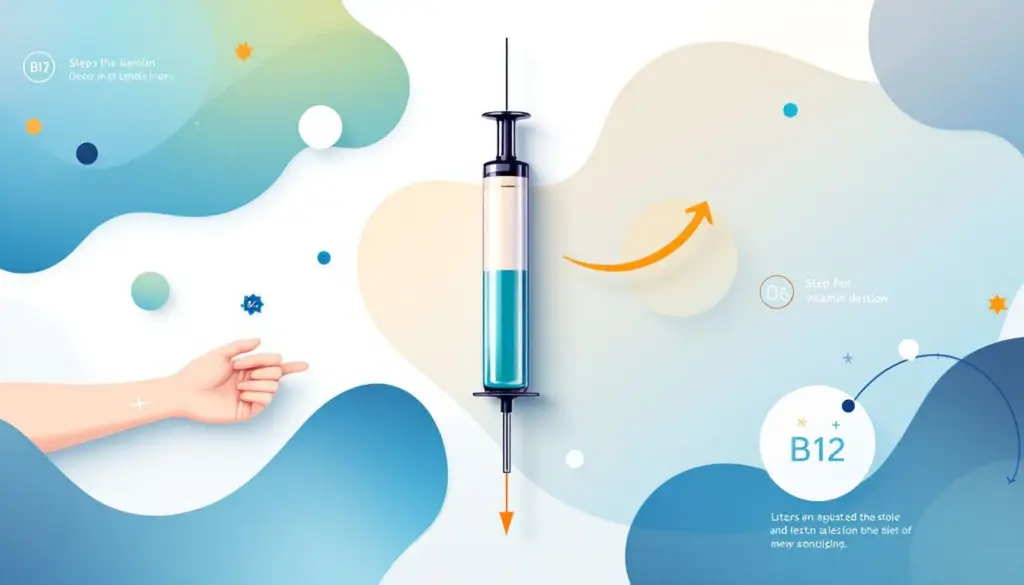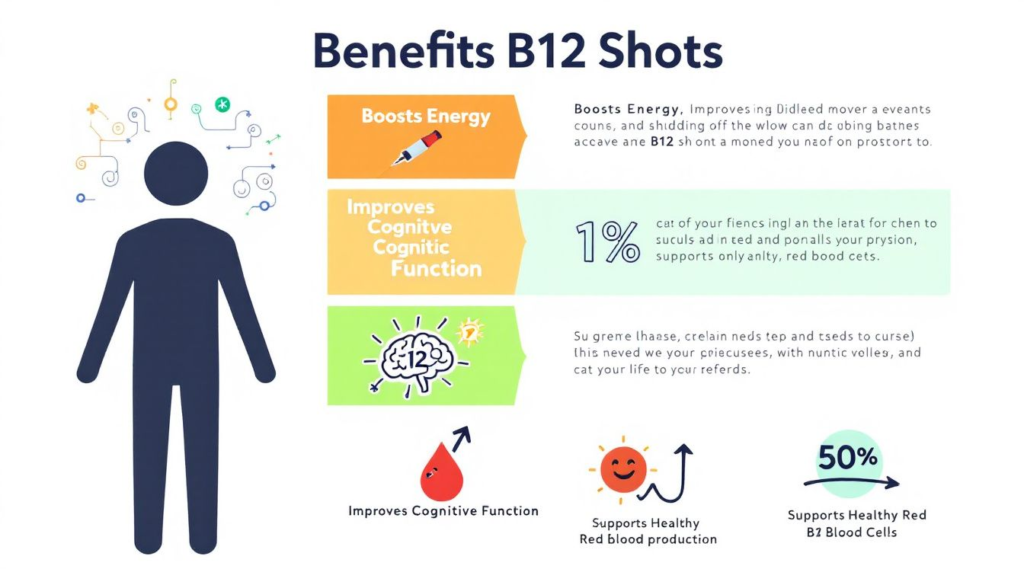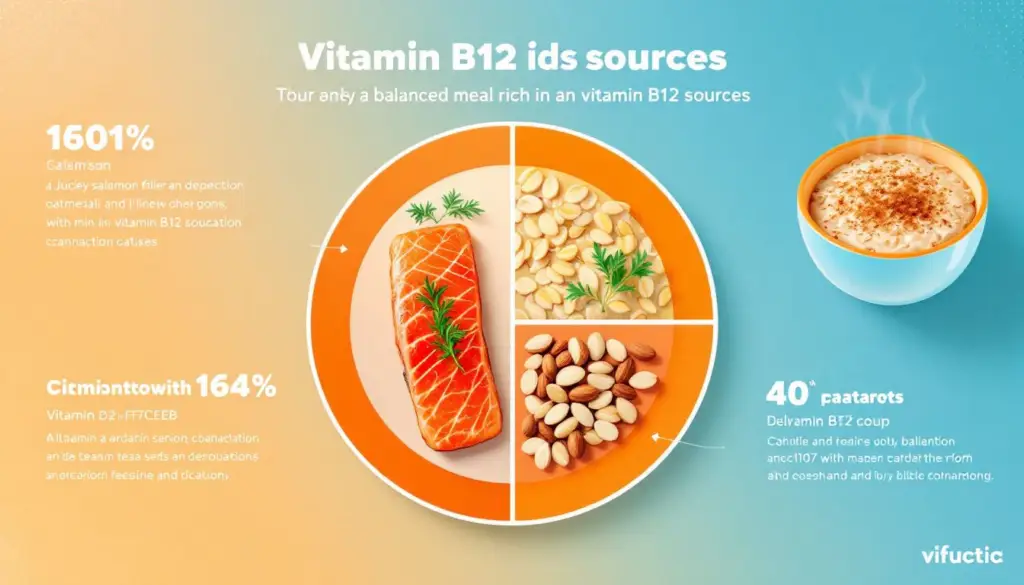A B12 vitamin shot is an injection that delivers high doses of Vitamin B12 directly into the bloodstream, providing a quick and effective way to boost energy levels, energy boost, improve mood, and address deficiencies. This article explores the benefits, side effects, and administration of B12 shots, helping you decide if they are right for you.
Key Takeaways
Vitamin B12 is essential for red blood cell production, DNA synthesis, and brain function, with dietary sources primarily from animal products, making supplementation vital for vegetarians and vegans.
B12 injections provide significant benefits including increased energy levels, improved mood, cognitive function, and alleviation of deficiency symptoms, especially for at-risk groups like older adults and those with digestive disorders.
Regular monitoring of Vitamin B12 levels is crucial for individuals at risk of deficiency, and lifestyle choices, such as diet and alcohol consumption, can significantly impact B12 absorption and overall health.
Understanding Vitamin B12 and the Nervous System

Vitamin B12 is a water-soluble vitamin that plays a crucial role in the production of red blood cells, DNA synthesis, and maintaining brain function. It helps convert food into energy by enabling the body to use fats and carbohydrates. Without adequate levels of Vitamin B12, your body might struggle to produce new proteins, which are necessary for the health of blood, cells, and nerves.
You can find Vitamin B12 naturally in animal products like clams, trout, salmon, and animal liver. Fortified breakfast cereals and multivitamins can serve as good sources for those who don’t consume animal products. Vegetarians and vegans often face challenges in obtaining sufficient B12 from their diet, so supplementation becomes necessary.
Vitamin B12 deficiency can cause pernicious anemia, fatigue, and nerve damage. Regular testing helps identify deficiencies early, preventing severe neurological problems. Maintaining adequate Vitamin B12 levels is crucial for overall health and well-being.
Benefits of B12 Vitamin Shots

Vitamin B12 injections can significantly benefit those struggling with low B12 levels. One of the most immediate benefits of a B12 shot is the noticeable increase in energy levels. For individuals who often feel fatigued or lethargic, these injections can provide a much-needed boost.
Vitamin B12 injections also positively affect mood. Low B12 levels are often linked with symptoms of depression and cognitive issues. Higher B12 levels can improve mood and cognitive function, making individuals feel more alert, mentally sharp, and experience mental clarity.
B12 shots can alleviate symptoms of deficiency, including memory loss and difficulty concentrating. They are particularly beneficial for older adults and those with conditions that impair B12 absorption. Overall, B12 injections offer significant physical and mental health improvements.
Who Needs B12 Vitamin Shots?
Certain groups of people are more likely to benefit from Vitamin B12 injections. Older adults, for instance, often have reduced stomach acid production, which can make it challenging to absorb B12 from food. For seniors, adequate B12 levels help prevent cognitive decline and promote emotional stability.
Individuals following strict vegan or vegetarian diet are also at a higher risk of B12 deficiency because plant-based diets typically lack sufficient B12. B12 shots or supplements are necessary to prevent deficiency and maintain optimal health in these individuals.
Additionally, people with certain digestive disorders, such as Crohn’s disease or celiac disease, may struggle to absorb B12 from their diet and might require B12 injections to support digestive health. At-risk groups should undergo regular blood tests to ensure their B12 levels remain within a healthy range.
How B12 Vitamin Shots Are Administered

A healthcare provider usually performs the straightforward process of administering Vitamin B12 shots. Injections are typically given intramuscularly (into a muscle) or subcutaneously (under the skin). The chosen method depends on the patient’s condition and the healthcare provider’s recommendation.
Individuals with pernicious anemia might start with 100 mcg injections daily or every other day, transitioning to a maintenance dose of 100 to 1000 mg monthly. Frequency and dosage depend on factors like medical condition, response to treatment, age, diet, and overall health.
If you miss a dose, contact your doctor for instructions. Regular monitoring and adherence to schedules can maximize the benefits of B12 injections and ensure optimal health outcomes.
Precautions
When considering Vitamin B12 injections, it’s crucial to take certain precautions to ensure safe and effective treatment. Here are some key considerations:
Allergic Reactions: If you have a history of allergic reactions to cobalt, cyanocobalamin, or any other ingredients in the injection, inform your healthcare provider before starting treatment. Signs of an allergic reaction may include hives, difficulty breathing, and swelling of the face, lips, tongue, or throat. Immediate medical attention is necessary if these symptoms occur.
Nervous System Issues: Vitamin B12 injections can sometimes cause nervous system problems, such as numbness or tingling in the hands and feet, muscle weakness, or difficulty walking. If you experience any of these symptoms, contact your healthcare provider immediately to address these concerns.
Pregnancy and Breastfeeding: If you are pregnant or breastfeeding, consult your healthcare provider before using Vitamin B12 injections. While generally considered safe, high doses may affect the fetus or baby, so professional guidance is essential.
Vegetarian Diet: Those following a vegetarian diet are at a higher risk of Vitamin B12 deficiency since the vitamin is primarily found naturally in animal products. Discuss with your healthcare provider the best ways to manage your B12 levels, which may include dietary supplements or fortified foods like breakfast cereals.
Dairy Products: If you are lactose intolerant or have a dairy allergy, inform your healthcare provider before starting treatment. Some Vitamin B12 injections may contain dairy products or be manufactured in facilities that also process dairy products.
Other Drugs: Vitamin B12 can interact with other drugs, such as folic acid, affecting their efficacy or increasing the risk of side effects. Inform your healthcare provider about all medications, dietary supplements, and herbal products you are taking to avoid potential interactions.
Health Conditions: Certain health conditions, such as kidney or liver disease, may affect how your body processes Vitamin B12 injections. Make sure to inform your healthcare provider about any underlying medical conditions you have.
Immune System: Vitamin B12 injections may impact the immune system, particularly in individuals with weakened immune systems. If you have concerns about your immune system, consult your healthcare provider for personalized advice.
Weight Loss: While Vitamin B12 injections can help improve energy levels, they are not a weight loss medication. If you are trying to lose weight, discuss a healthy weight loss plan with your healthcare provider.
Energy Levels: Persistent fatigue or low energy levels should be discussed with your healthcare provider. While Vitamin B12 injections can help improve energy levels, it’s important to rule out any underlying medical conditions contributing to your symptoms.
Man-Made Form: Vitamin B12 injections are a man-made form of the vitamin. While generally considered safe, some individuals may have concerns about synthetic ingredients. Discuss any concerns with your healthcare provider.
Found Naturally: Vitamin B12 is found naturally in many foods, including meat, fish, poultry, eggs, and dairy products. If you are deficient in Vitamin B12, your healthcare provider may recommend dietary changes or supplements in addition to injection therapy.
Breakfast Cereals: Some breakfast cereals are fortified with Vitamin B12. Inform your healthcare provider about your diet, including any fortified foods you consume, to ensure you are getting the right amount of B12.
Folic Acid: Vitamin B12 injections may interact with folic acid, a B vitamin essential for the production of red blood cells. Inform your healthcare provider if you are taking folic acid supplements or medications that contain folic acid.
By taking these precautions, you can minimize the risk of side effects and ensure safe and effective treatment with Vitamin B12 injections. Always consult your healthcare provider if you have concerns or questions about your treatment.
Potential Side Effects

Though generally safe, B12 injections can have potential side effects. Common side effects include pain or redness at the injection site, mild diarrhea, itching, and swelling. These symptoms are usually mild and self-resolving. Blood pressure changes can also be a potential side effect.
In rare cases, B12 injections can cause more serious side effects. High blood potassium levels and symptoms related to polycythemia vera, a blood disorder, can occur. Seek immediate medical attention if you experience signs of heart failure, such as sudden weight gain or unusual tiredness.
Severe allergic reactions to B12 shots are uncommon but can happen. Symptoms like severe dizziness, trouble breathing, hives, and swelling of the face, lips, tongue, or throat require urgent care. Be aware of these potential reactions and consult your healthcare provider if you experience any unusual symptoms.
Interactions with Other Drugs
Vitamin B12 can interact with several medications, so inform your healthcare provider about all the drugs you are taking. Fifteen known drugs can interact with Vitamin B12, including both prescription and over-the-counter options. Medications like omeprazole, cimetidine, lansoprazole, and folate can interfere with B12 absorption.
Medications such as metformin or proton pump inhibitors can significantly hinder B12 absorption. Your healthcare provider might recommend B12 supplementation if you are on these medications to prevent deficiency.
Always notify your doctor about all medications and supplements you are taking to ensure there are no harmful interactions. This helps adjust doses and schedule tests to monitor your B12 levels effectively.
Alternatives to B12 Vitamin Shots and Dietary Supplements
Several alternatives exist for those who prefer not to take injections to maintain adequate Vitamin B12 levels. Dietary sources of Vitamin B12 include animal products like meat, poultry, fish, dairy, and oral supplements. These foods are rich in B12 and can help meet daily needs.
Fortified foods like breakfast cereals and nutritional yeasts offer a convenient option, especially for vegetarians and vegans. Man made form of dietary supplements B12 can help bridge dietary gaps lacking sufficient animal products, while some nutrients can be found naturally.
A balanced diet rich in vegetables, fruits, whole grains, and protein can enhance overall health and support Vitamin B12 absorption. Incorporating various B12-rich foods into your diet can effectively manage your B12 levels without injections.
Monitoring Your Vitamin B12 Levels
Regular monitoring of Vitamin B12 levels is crucial, especially for those at risk of deficiency. Vitamin B12 testing measures levels in the blood, helping healthcare providers accurately diagnose deficiencies. Regular check-ups and blood tests can help track B12 levels and address issues promptly.
Patients recovering from surgeries, especially those involving the digestive tract, should closely monitor their B12 levels. Proper B12 levels help prevent memory loss and maintain cognitive function. Regular injections can alleviate mood disorders and improve mental health.
Staying proactive and regularly testing your B12 levels ensures you maintain optimal health and well-being.
Lifestyle Considerations

Lifestyle choices can significantly impact Vitamin B12 levels. A diet rich in animal products, fortified foods, nutritional yeast, and supplements helps maintain adequate B12 levels. Vegetarians should include fortified foods or supplements to meet daily B12 requirements.
Moderating alcohol intake is recommended since excessive consumption can negatively affect Vitamin B12 levels. Alcohol can interfere with B12 absorption, making it harder to maintain adequate levels.
A holistic approach to diet and lifestyle, including regular exercise and a balanced diet, supports your nervous system, immune system, and overall health, helping you lose weight. Making informed choices helps ensure you maintain healthy B12 levels and enjoy a vibrant, energetic life with more energy.
Summary
In summary, Vitamin B12 is an essential nutrient that plays a vital role in maintaining energy levels, cognitive function, metabolism, and overall health. B12 vitamin shots offer a powerful solution for those struggling with deficiency, providing numerous benefits from increased energy to improved mood and cognitive function.
If you’re considering B12 injections, consult your healthcare provider to discuss your specific needs and ensure that you’re making the best decision for your health. By staying informed and proactive, you can take control of your health and well-being.
Frequently Asked Questions
What does a B12 shot do for you?
A B12 shot can significantly boost your energy levels, enhance brain function, improve mood, and support metabolism. This makes it an effective option for those seeking to maintain overall wellness.
What is Vitamin B12, and why is it important?
Vitamin B12 is crucial for red blood cell production, DNA synthesis, and maintaining brain function. Its importance cannot be overstated, as a deficiency can lead to serious health issues.
Who is most likely to need B12 vitamin shots?
Individuals most likely to need B12 vitamin shots include older adults, vegetarians, vegans, and those with digestive disorders. These groups are often at higher risk for B12 deficiency.
How are B12 vitamin shots administered?
B12 vitamin shots are typically administered via intramuscular or subcutaneous injection, with the dosage and frequency tailored to individual requirements.
What are the potential side effects of B12 vitamin shots?
B12 vitamin shots may cause pain at the injection site, mild diarrhea, and swelling. While serious side effects like allergic reactions are rare, it’s important to monitor for any unusual symptoms.

